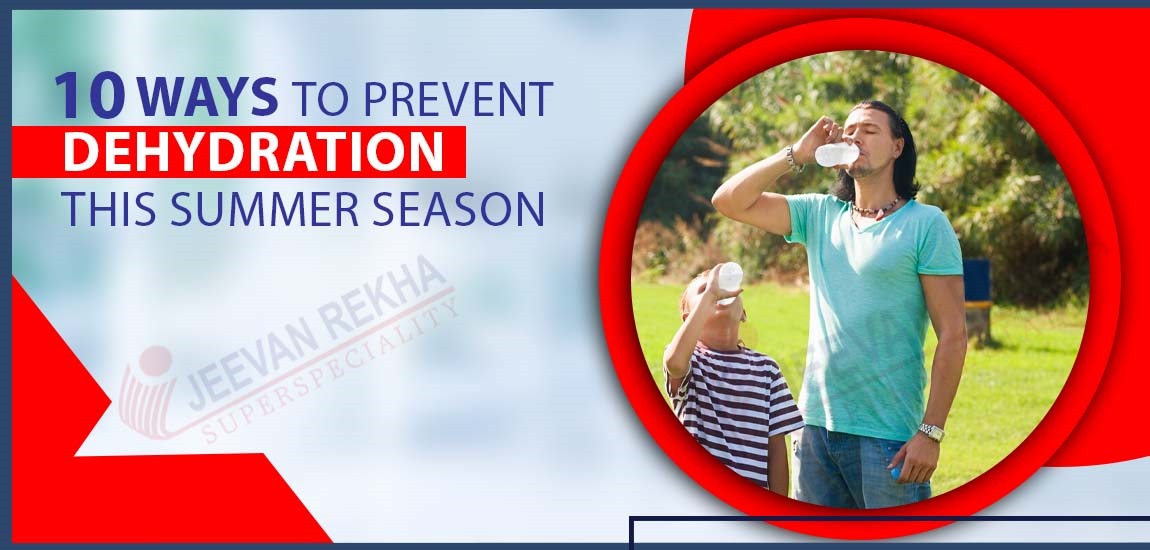
- By Admin
- In Health and Tips,
- Posted June 15, 2024
10 Ways to Prevent Dehydration This Summer Season
"The risk of becoming dehydrated during the summer increases with rising temperatures."
During the summer months, higher temperatures increase sweating as the body tries to cool itself down. This natural cooling mechanism can result in significant fluid loss if adequate hydration is not maintained.
Dehydration occurs when the body loses more fluids (water and electrolytes) than it takes in through drinking and eating. This imbalance disrupts essential bodily functions, affecting everything from circulation and temperature regulation to digestion and cognitive function.
Symptoms of dehydration range from mild thirst and dry mouth to more severe signs such as dizziness, fatigue, and confusion. In extreme cases, dehydration can lead to heat exhaustion or heat stroke, which are serious medical emergencies requiring immediate attention.
To combat these risks, it's essential to adopt proactive measures to stay hydrated. This includes drinking plenty of water throughout the day, especially during peak heat hours. Hydrating foods like fruits (e.g., watermelon, and strawberries) and vegetables (e.g., cucumber, and lettuce) can also contribute significantly to your fluid intake.
Furthermore, being mindful of outdoor activities and taking breaks in shaded or cool areas can help reduce the risk of excessive fluid loss through sweating. By maintaining a balance of fluid intake and output, you can ensure your body remains properly hydrated and functions optimally, even in the sweltering summer heat.
10 Tips to Prevent Dehydration:
Certainly! Here are ten tips to prevent dehydration:
- Drink Plenty of Water: Water is essential for maintaining bodily functions and regulating temperature, especially in hot weather. Eight glasses (8 ounces each) of water should be consumed daily, according to general recommendations. If you're active or spending time outdoors in the heat, you may need more. Carry a reusable water bottle with you to make it easier to stay hydrated throughout the day.
- Hydrating Foods: Many fruits and vegetables have high water content, making them excellent choices for hydration. Watermelon, oranges, strawberries, cucumbers, celery, and lettuce are examples of hydrating foods. These foods not only provide water but also essential vitamins, minerals, and antioxidants that contribute to overall health.
- Avoid Excessive Alcohol: Alcohol is a diuretic, meaning it increases urine production and can contribute to dehydration. If you consume alcohol, do so in moderation and balance it with plenty of water. Alternate alcoholic drinks with glasses of water to stay hydrated.
- Limit Caffeine: Like alcohol, caffeine can also have a diuretic effect and increase urine output. While moderate caffeine intake (from coffee, tea, or sodas) is generally safe for most people, excessive consumption can lead to dehydration. Be mindful of your caffeine intake and balance it with water throughout the day.
- Drink Electrolyte Beverages: When you sweat, you lose electrolytes such as sodium, potassium, and magnesium, which are crucial for maintaining fluid balance and muscle function. Sports drinks or electrolyte-enhanced waters can help replenish these electrolytes during and after strenuous activities or prolonged exposure to heat.
- Set Reminders: It's easy to forget to drink water, especially when you're busy or not feeling particularly thirsty. For regular reminders to sip water throughout the day, set alarms or use apps on your smartphone. Setting a schedule can help you establish a hydration routine.
- Stay Indoors During Peak Heat: During the hottest parts of the day, typically from late morning to mid-afternoon, try to stay indoors or seek shade whenever possible. If you need to be outside, plan activities for cooler times of the day, such as early morning or evening, to reduce the risk of overheating and dehydration.
- Wear Light Clothing: Clothing that is lightweight, loose-fitting, and made from breathable fabrics (such as cotton) allows sweat to evaporate and helps cool your body. Dark-coloured and tightly woven fabrics can trap heat and increase your risk of dehydration and heat-related illnesses.
- Monitor Urine Color: One simple way to assess your hydration status is to check the colour of your urine. Urine that is pale or light yellow usually indicates that you are properly hydrated. Darker yellow, amber, or orange-coloured urine may indicate dehydration. Aim for pale yellow urine as a sign that you are well-hydrated.
- Take Breaks During Exercise: If you're physically active or exercising outdoors, take regular breaks to rest in the shade or indoors. Use these breaks to drink water or electrolyte beverages to replace fluids lost through sweat. Avoid pushing yourself too hard in extreme heat, as this can increase the risk of dehydration and heat-related illnesses.
By incorporating these tips into your daily routine, you can effectively prevent dehydration and ensure that your body stays hydrated and healthy, especially during the summer months when the risk of dehydration is higher.
Also read: Adjustment Disorder: Types, Causes, Symptoms
Conclusion:
In conclusion, staying hydrated is crucial, especially in the summer when higher temperatures and outdoor activities increase fluid loss through sweating. Dehydration, caused by insufficient fluid intake, impairs vital functions like circulation and temperature regulation. Mild dehydration leads to symptoms like dry mouth and headaches, while severe cases can result in dizziness or heat stroke.
To prevent dehydration, follow these tips: drink plenty of water; eat hydrating foods like fruits and vegetables, and moderate alcohol and caffeine intake. Wear light, breathable clothing, monitor urine colour, and take breaks during outdoor activities to maintain hydration levels.
Remember, hydration isn't just about water; electrolytes like sodium and potassium are vital too. By adopting these measures, you can stay hydrated and enjoy a safe and refreshing summer.
Tags
Blog Search
Latest Posts
-
Ear Infections (Otitis Media): Top Triggers & How to Avoid Them?
April 11, 2025 -
Implantation Bleeding Vs Periods: Know the Difference
March 12, 2025 -
5 Tips for a Happy and Healthy Summer
February 27, 2025 -
Body Ache (Pain): Causes, Symptoms and Treatment Options
February 10, 2025 -
Fatigue and Exhaustion: Causes, Symptoms, and Treatment
January 08, 2025




